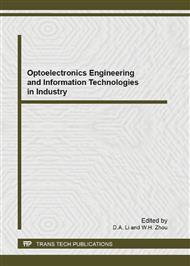p.1812
p.1817
p.1821
p.1825
p.1831
p.1836
p.1842
p.1847
p.1851
Application of Artificial Fish-Swarm Algorithm in the Optimization for Taxi Dispatching System
Abstract:
Currently, the taxi empty crossing probability (ECP) is high, while taking a taxi is very difficult for people. This phenomenon is largely caused by the extensive mode of taxi operations. Aiming at this problem, a kind of intelligent optimization method based on the Artificial Fish-swarm Algorithm (AFSA) is proposed for taxi scheduling in this paper. Firstly, the design of this intelligent taxi dispatching system is introduced, and the taxi scheduling method based on grid dispatching algorithm is described simply. Then the method of using the AFSA to optimize the global distribution of empty taxis is mainly introduced. The purpose of this optimization method is to make the distribution of empty taxis consistent to the current distribution of passengers predicted according to the historical scheduling data. Finally, the effectiveness of the AFSA optimization method is verified by the taxis and passengers distribution which is obtained through MATLAB simulation. Moreover, this method has a better global optimizing effect compared with the method of using the Particle Swarm Optimization (PSO) algorithm to optimize the taxis distribution.
Info:
Periodical:
Pages:
1831-1835
Citation:
Online since:
September 2013
Authors:
Price:
Сopyright:
© 2013 Trans Tech Publications Ltd. All Rights Reserved
Share:
Citation:


